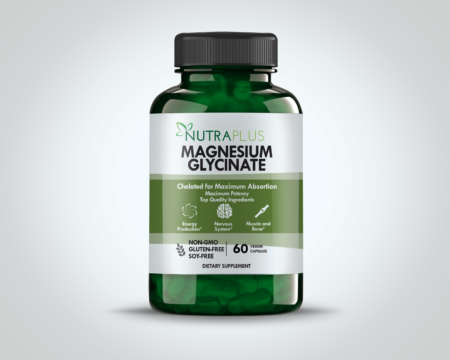Descripción
What is Magnesium Glycinate?
Magnesium glycinate is a chelated compound, formed by the combination of magnesium and glycine, an amino acid. This particular form of magnesium is increasingly recognized for its superior absorption properties compared to other forms of magnesium supplements. Unlike magnesium oxide, which is poorly absorbed, magnesium glycinate showcases a higher bioavailability, making it an effective option for those looking to supplement their magnesium intake.
In the human body, magnesium plays a critical role in numerous physiological functions. This essential mineral is involved in over 300 enzymatic reactions, contributing to muscle contraction, nerve function, and energy production. It also plays a vital role in regulating blood pressure, supporting immune system health, and maintaining bone integrity. The significance of magnesium cannot be overstated; deficiencies can lead to various health issues, including muscle cramps, fatigue, and increased stress levels.
The synthesis of magnesium glycinate occurs through a process where magnesium is bound to glycine. This binding not only enhances the absorption of magnesium but also reduces the potential gastrointestinal side effects typically associated with magnesium supplementation, such as diarrhea. As a result, magnesium glycinate is often recommended for individuals who may have a sensitivity to other forms of magnesium.
Considering the benefits of magnesium glycinate, it is an optimal choice for those seeking to boost their magnesium levels effectively. By ensuring adequate magnesium intake through supplements like magnesium glycinate, individuals may experience improvements in overall health, vitality, and well-being.
Health Benefits of Magnesium Glycinate
Magnesium glycinate, a chelated form of magnesium, has gained recognition for its multitude of health benefits, particularly in the realm of mental and physical well-being. One of the primary advantages of magnesium glycinate is its ability to alleviate anxiety and stress. Research has shown that magnesium plays a crucial role in the neurochemical processes that regulate mood. Supplementing with magnesium glycinate may help enhance overall emotional health, consequently reducing symptoms of anxiety and enhancing feelings of tranquility.
Furthermore, magnesium glycinate is known for its significant impact on sleep quality. Studies indicate that adequate magnesium levels correlate with improved sleep patterns, helping individuals fall asleep faster and experience deeper, more restorative sleep. This is particularly important in our fast-paced modern lives, where stress-related sleep disturbances are commonplace. By promoting relaxation, magnesium glycinate can serve as a natural remedy for insomnia and other sleep-related issues.
In terms of physical health, magnesium glycinate plays a vital role in muscle function and recovery. It helps to regulate muscle contractions and supports the repair process post-workout, thus preventing cramps and soreness. Athletes and fitness enthusiasts often turn to this supplement to enhance performance and promote quicker recovery times.
Additionally, magnesium is essential for heart health. Sufficient intake of magnesium glycinate has been linked to improved cardiovascular function, as it assists in maintaining normal blood pressure levels. Various studies have identified a correlation between magnesium deficiency and an increased risk of cardiovascular diseases, reinforcing the importance of this mineral in diet or supplementation.
Given its broad range of benefits, magnesium glycinate stands out among other forms of magnesium. Its superior bioavailability ensures that the body can effectively utilize the mineral, making it a well-regarded choice for those seeking to enhance their health through supplementation.
Dosage and Recommendations
Determining the correct dosage of magnesium glycinate can vary significantly based on age, health condition, and individual lifestyle. Generally, for healthy adults, the recommended daily allowance (RDA) for magnesium ranges from 310 mg to 420 mg, depending on gender and age. For instance, adult males aged 19-30 are advised to consume approximately 400 mg per day, while their female counterparts should aim for about 310 mg. Older adults may need slightly more due to changes in absorption and dietary habits. Children and adolescents also require varying amounts, usually ranging from 80 mg to 410 mg, contingent on their development stage.
Factors that influence magnesium glycinate needs include dietary intake—individuals consuming a magnesium-rich diet may require less supplementation—lifestyle choices, such as exercise frequency, and specific health goals, including managing stress or optimizing sleep. It is crucial to consider that high levels of physical activity can deplete magnesium stores, suggesting a possible need for higher dosages among athletes.
When selecting a magnesium glycinate supplement, one must prioritize quality and appropriate dosing. Reading labels carefully is essential for understanding the amount of elemental magnesium provided per serving. Additionally, it is advisable to choose products that disclose the source of their magnesium and include information regarding any third-party testing for purity and potency. Look for supplements that are free from unnecessary fillers and artificial additives. If unsure about the right dosage, consulting with a healthcare provider can provide personalized advice tailored to individual health conditions and goals.
Potential Side Effects and Interactions
Magnesium glycinate is widely recognized for its health benefits, particularly in promoting relaxation and reducing muscle tension. However, as with any dietary supplement, there are potential side effects and interactions that users should be aware of before incorporating it into their routine. One of the most commonly reported side effects is gastrointestinal discomfort. Some individuals may experience symptoms such as diarrhea, nausea, or an upset stomach, particularly if they consume magnesium glycinate in excessive doses. To mitigate these effects, it is advisable to start with a lower dose and gradually increase it as tolerated.
Furthermore, magnesium glycinate may interact with certain medications. Individuals taking diuretics, antibiotics, or medications for heart disease should exercise caution, as magnesium can influence the effectiveness of these drugs. Additionally, magnesium supplements can potentially interfere with the absorption of specific medications, including some prescribed for osteoporosis or acid reflux. Therefore, it is crucial to discuss your current medications with a healthcare provider when considering magnesium glycinate supplementation.
Those with existing health conditions must also approach magnesium glycinate with care. Individuals with kidney problems should be particularly cautious, as the kidneys are responsible for excreting excess magnesium. Consequently, an accumulation of magnesium in such patients can lead to serious health issues, including paralysis or cardiac arrest. It is recommended that anyone with compromised kidney function consult their healthcare provider before beginning magnesium supplementation.
In summary, while magnesium glycinate has many potential health benefits, being informed about its possible side effects and interactions will facilitate safe usage. Consulting with a qualified healthcare professional is essential to ensure that magnesium glycinate is appropriate for your unique health circumstances and to avoid any unwanted complications.
Incorporating Magnesium Glycinate into Your Routine
Magnesium glycinate is a versatile supplement that can easily be incorporated into daily routines to enhance overall well-being. To optimize its benefits, it is essential to consider both the timing and dosage forms. Magnesium glycinate is available in various forms such as capsules, powders, or liquid formulations. Choosing the right form depends on individual preferences and lifestyle. For example, capsules are convenient for those who prefer a quick and easy method of intake, while powders can be mixed into beverages for a more customized approach.
When integrating magnesium glycinate into your routine, timing can be crucial. Many individuals find it beneficial to take magnesium glycinate in the evening, as it may promote relaxation and improve sleep quality. Consuming the supplement with food can also enhance absorption, reducing the likelihood of gastrointestinal discomfort. It is advisable to start with a lower dosage and gradually increase it, allowing your body to adapt over time. Typical doses range from 100 mg to 400 mg per day, depending on individual health needs.
In addition to supplementation, adopting lifestyle changes can further improve magnesium intake. Incorporating magnesium-rich foods into your diet is a great strategy. Leafy greens, nuts, seeds, whole grains, and legumes are excellent sources. Additionally, reducing the consumption of processed foods can help retain magnesium levels in the body. Regular physical activity and managing stress are also critical, as these factors can influence magnesium absorption and utilization.
Many individuals have shared their positive experiences after integrating magnesium glycinate into their daily regimen. Users report improved sleep patterns, decreased anxiety, and enhanced muscle relaxation. These testimonials highlight the potential benefits of this supplement, reinforcing the importance of incorporating magnesium glycinate thoughtfully into one’s routine for optimal health and wellness.












Valoraciones
No hay valoraciones aún.